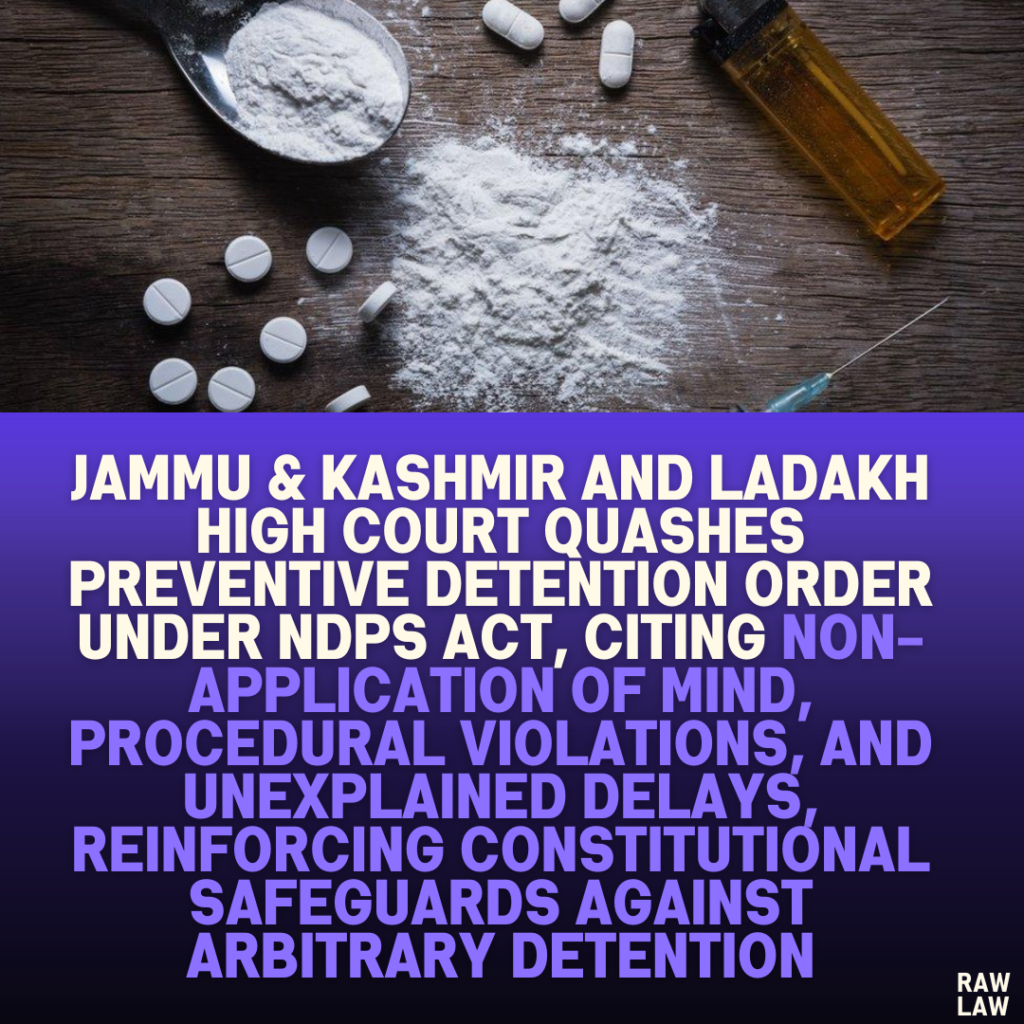Court’s Decision:
The High Court of Jammu & Kashmir and Ladakh quashed the preventive detention order against the petitioner under the NDPS Act, finding that the Detaining Authority had failed to exercise due application of mind, and there were significant procedural lapses. The Court also highlighted that the delay in issuing and executing the detention order severed the connection between the alleged acts and the detention.
Facts:
- The petitioner was detained under an order dated January 29, 2024, issued by the Divisional Commissioner of Jammu under the NDPS Act. The detention order aimed to prevent the petitioner from engaging in drug trafficking activities.
- The detention was based on:
- Three FIRs filed from 2021 to 2023.
- Daily Diary Reports (DDRs) and an Istghasa.
- Alleged involvement in illicit drug trafficking that posed a threat to public health and youth.
- The petitioner was granted bail in all the registered cases, and no evidence showed he violated bail conditions.
- The petitioner argued that the detention was merely an attempt to nullify the bail orders and lacked justification due to the significant time lapse between the last alleged incident and the detention order.
Issues:
- Was the detention order valid under the procedural safeguards mandated by Article 22(5) of the Constitution and the NDPS Act?
- Did the delay in issuing and executing the detention order invalidate it?
Petitioner’s Arguments:
- Non-Application of Mind:
- The Detaining Authority failed to provide a live and proximate link between the alleged activities (last incident in January 2023) and the detention order issued a year later.
- Reliance on DDRs, which do not lead to penal actions, demonstrated a lack of substantive justification.
- Violation of Constitutional Safeguards:
- The petitioner was not provided with all relevant material to make an effective representation, violating Article 22(5).
- Procedural safeguards under Section 3 of the NDPS Act were breached.
- Delay Severing Live Link:
- The 12-month gap between the alleged acts and the detention order severed the required causal connection.
- Execution of the detention order was delayed by 33 days without explanation.
- Regular Criminal Law Adequacy:
- The petitioner argued that he was already facing trial for the alleged offenses, making preventive detention unnecessary.
Respondent’s Arguments:
- Preventive Nature of Detention:
- The respondents argued that the petitioner posed an ongoing threat to public health and safety, warranting preventive detention.
- The Detaining Authority carefully considered the petitioner’s conduct before issuing the order.
- Procedural Compliance:
- They claimed that the grounds of detention were adequately communicated to the petitioner.
- Judicial Precedents:
- Cited Supreme Court judgments like Naresh Kumar Goyal v. Union of India to justify the preventive detention even when criminal prosecution was ongoing.
Analysis of the Law:
- Live and Proximate Link:
- The Court underscored that preventive detention orders must demonstrate a direct connection between alleged prejudicial activities and the need for detention. Reliance on Rajinder Arora v. Union of India emphasized that undue delay can sever this link.
- Procedural Safeguards:
- Article 22(5) mandates that detenues be provided with all material necessary for making a representation, a requirement not fulfilled in this case.
- Non-compliance with Section 3(3) of the NDPS Act, which ensures procedural adherence, rendered the order invalid.
- Judicial Precedents:
- The Court referred to Rekha v. State of Tamil Nadu and Rameshwar Shaw v. District Magistrate to emphasize that preventive detention must not serve as a substitute for criminal prosecution.
Precedent Analysis:
- Rameshwar Shaw v. District Magistrate (1964):
- Held that past acts must be proximate in time and rationally connected to justify detention.
- Rajinder Arora v. Union of India (2006):
- Established that delays in passing detention orders weaken the necessary causal connection.
- Rekha v. State of Tamil Nadu (2011):
- Highlighted that preventive detention impacts fundamental rights and must be exercised sparingly.
- Sushanta Kumar Banik v. State of Tripura (2022):
- Ruled that undue and unexplained delays invalidate detention orders due to the snapped live link.
Court’s Reasoning:
- Non-Application of Mind:
- The Detaining Authority relied mechanically on materials provided by the Sponsoring Agency without critically examining their relevance.
- The DDRs cited in the detention grounds lacked substantive legal outcomes, undermining the justification for detention.
- Procedural Lapses:
- Failure to provide all relevant materials and adequate communication of grounds to the petitioner violated constitutional protections.
- Unexplained Delay:
- The unexplained delay of 33 days in executing the order further weakened the connection between the petitioner’s alleged acts and the detention.
- Inadequacy of Regular Criminal Law:
- The respondents failed to demonstrate why regular criminal law was insufficient to address the petitioner’s alleged activities.
Conclusion:
The Court quashed the detention order, ruling it illegal and procedurally flawed. It directed the immediate release of the petitioner.
Implications:
This judgment underscores the need for strict adherence to constitutional safeguards in preventive detention cases. It emphasizes that:
- Preventive detention must not replace criminal prosecution.
- Procedural safeguards under Article 22(5) and statutory laws must be rigorously observed.
- Authorities must provide a rational and proximate basis for detention, avoiding mechanical reliance on prior acts.
